October 1. BAHAR DAR "The Source of the Blue Nile" Breakfast at the hotel was weak but better than the meal we'd had when we arrived. At least the poolside setting was pleasant and the flies weren't too bad. Our plan for the day was to visit Tis Isat, the Blue Nile water falls, source of the Blue Nile. Our hotel offered tours but they were expensive so we decided to go at in on our own. We hadn't really tried much public transport in Ethiopia so this was our chance. However, our first attempt failed. We hopped in a minivan that said it was going to Tis Isat and started to drive out of town. By the time we drove about five ki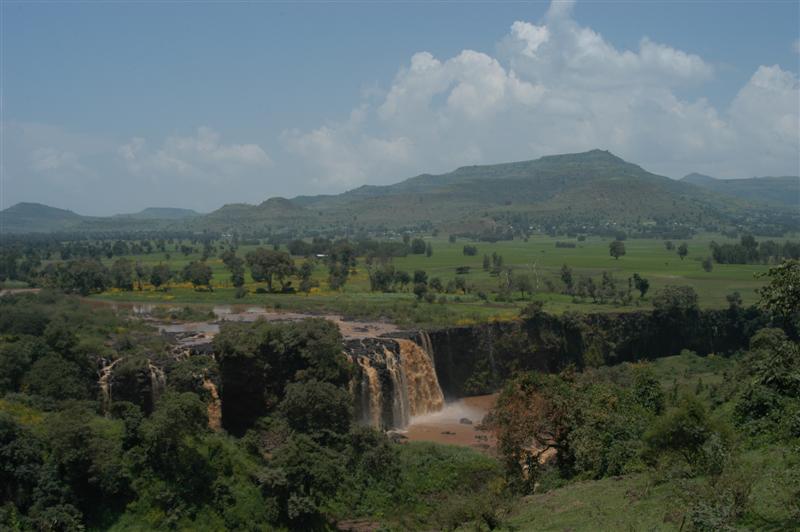 lometers most of the people had gotten out. When we reached the end of the line we were out in the middle of nowhere. We explained again where we wanted to go, making gestures to indicate the waterfall. Finally we got through and everybody had a good laugh. We were nowhere near Tis Isat. The pointed back in the direction that we had come and explained that we needed a big bus. That had been what our guidebook said but we had grown skeptical. Too often the local transport options were incomplete and we thought that we'd found a better way. Well, we were wrong. So we climbed back in the van and rode back into town. lometers most of the people had gotten out. When we reached the end of the line we were out in the middle of nowhere. We explained again where we wanted to go, making gestures to indicate the waterfall. Finally we got through and everybody had a good laugh. We were nowhere near Tis Isat. The pointed back in the direction that we had come and explained that we needed a big bus. That had been what our guidebook said but we had grown skeptical. Too often the local transport options were incomplete and we thought that we'd found a better way. Well, we were wrong. So we climbed back in the van and rode back into town.
The bus station was at the center of Bahar Dar, near our international phone center. After asking a few people we were led to a rattletrap bus that was nearly full. We climbed aboard and grabbed a seat next to a young German guy and his local guide, who were in the very back seat. He was the only other foreigner on the bus. People glanced as us once in a while but Bahar Dar got enough tourists that we were hardly a novelty. We chatted up the German guy who had been traveling overland through Ethiopia. It certainly sounded like an exercise in patience. He told us that the last 60 kilometers up to Lalibela took the bus some three hours! I was so glad that we were flying! All across Ethiopia the roads aren't paved, making transport of people and goods a problem. It was a contributing factor to the Ethiopia's ongoing problem with famine. They have the food but they just don't have the means to effectively transport it to where it needs to go. It took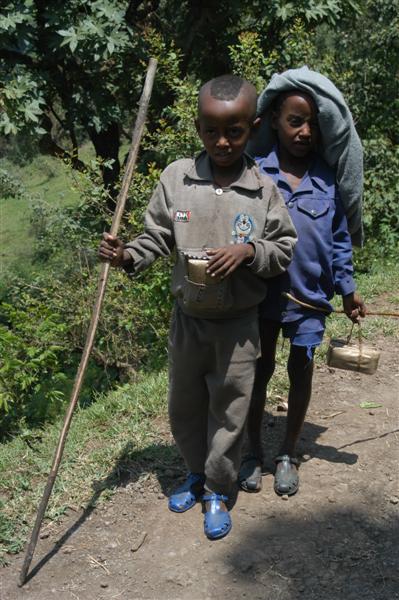 some time before the bus was good and full and ready to go. Even the floor was stacked with stuff. We had a bowl full of something teetering around our feet. Most of the men on the bus were dressed in traditional herdsman attire, their long slender legs extending out of their shorts, many barefoot, carrying a tall wooden staff, and with a heavy cloth wrap heaped up over their shoulders. Looking at them you had to wonder if the staff kept them from tipping over with all of the extra weight on top. But the wrap was undoubtedly a versatile item that could be wrapped according to the weather. But it did seem rather impractical in the current warm climate. As the bus bumped along the dirt road I saw all of the staffs swaying back and forth in front of the herdsmen, their cloth wraps heaped up on their shoulders. some time before the bus was good and full and ready to go. Even the floor was stacked with stuff. We had a bowl full of something teetering around our feet. Most of the men on the bus were dressed in traditional herdsman attire, their long slender legs extending out of their shorts, many barefoot, carrying a tall wooden staff, and with a heavy cloth wrap heaped up over their shoulders. Looking at them you had to wonder if the staff kept them from tipping over with all of the extra weight on top. But the wrap was undoubtedly a versatile item that could be wrapped according to the weather. But it did seem rather impractical in the current warm climate. As the bus bumped along the dirt road I saw all of the staffs swaying back and forth in front of the herdsmen, their cloth wraps heaped up on their shoulders.
The bus ride only took about an hour to Tis Abay, the end of the bus line and closest village to the falls. We were soon accosted by touts, offering up their guiding services. The falls were not very far so were confident that we didn't need a guide but they were confident that we could be brow beaten into taking a guide. We found the ticket office and got directions. As we started off we picked up two touts that followed us the whole way. They stayed ahead of us but we recognized them and saw them looking back at us. They were both young guys but one was particularly short so he was very easy to spot. When we reached the ticket checkpoint Rob finally confronted them but it only seemed to make them more resolute. An older man passing by tried to waive them away for us but it wasn't until Rob threatened to throw one of them into the river that he backed off. The other one, the shorter fellow, caught up with again farther up the trail. We decided to just sit down for a while, glaring, until he finally went away. The trail continued through a small village where a couple of women looked like they were weaving and were selling cloth items. Little kids came trailing after us with all sorts of cloth, painted gourds, and I don't know what else. We 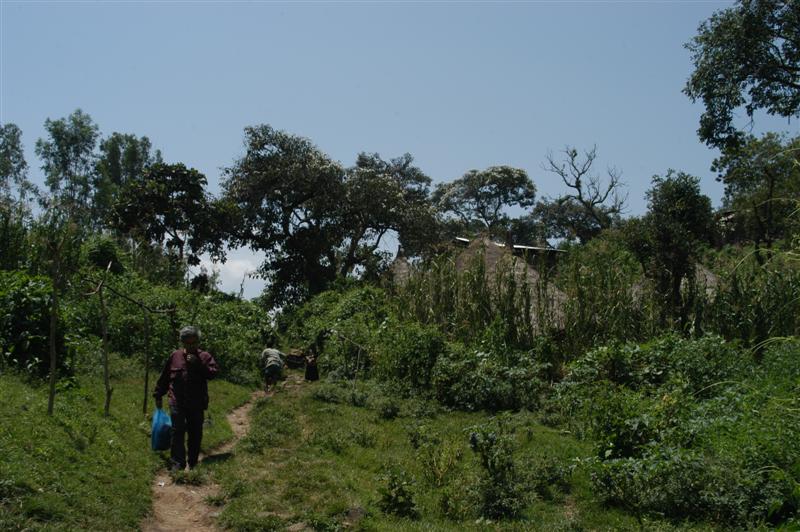 finally gave them a firm "no" and they turned back to the village. The trail continued above the village and over a ridge until the falls finally came into view. finally gave them a firm "no" and they turned back to the village. The trail continued above the village and over a ridge until the falls finally came into view.
The Blue Nile falls weren't exactly awe inspiring but we had low expectations from the start. They were supposed to have been more impressive before the dam was built up stream. Still they were letting more water out that normal so there was a pretty healthy gush of raging brown water spewing over the rocks. It actually might have been a bit more impressive if we hadn't just seen Victoria Falls a couple of months ago. We gazed at the falls from the trail and considered whether to go any further. The trail led all of the way to the base of the falls. We'd seen a few touts go on ahead of us so we just decided to avoid any more hassles and be content with a view from a far. As we were looking at the falls two small boys came around the trail with their herd of cows. It was just the two of them herds a number of cows. They were adorable. We greeted them and decided to ask for their photos, for 1 birr each of course. There isn't a photograph of anybody in Ethiopia that can be had for less!
When we passed back through the tiny village I stopped and bought a gabi, a white cloth worn by Ethiopian women. The cloth is draped over their heads, custom of Ethiopian Orthodoxy, and I felt it would be appropriate to have one when we visited the churches on Lake Tana. After I bought something from one woman the other one was keen to get a sale as well. She even picked up her weaving to try and interest me in a photo. She was a delicate looking old woman and I would have been tempted to buy something from her but, in truth, I was nearly out of money and we still had to get back to town and buy something to drink. She even took my hand, trying to persuade me. A pleasant little buying experience was on the verge of becoming another hassle. Two teenage guys swaggered down the trail and turned to heckle us and our purchase. They said the cloth was from Bahar Dar, not woven by these women. That may have been true but I didn't really care either way. Why they wanted to sabotage people in their own communities was puzzling. Certainly my impression of Ethiopian youth was becoming quite low. They continued to hassle us as we continued on our way, entertainment for them I suppose. We tried to ask them to politely go away but they just wanted to provoke us. Rob made a lunge at one of them and they scattered.
Back on the road to Tis Abay we picked up a young girl that was trying to sell her goods. She followed us for about 200 meters before giving up. After that we were tout free until we r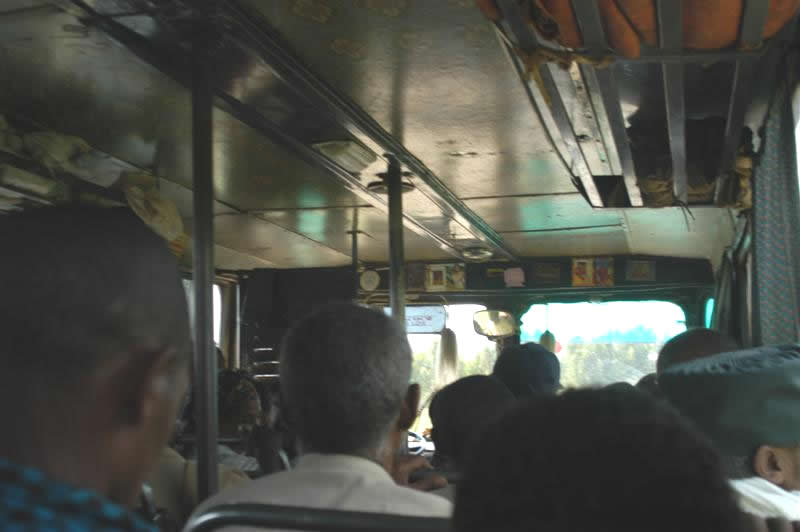 eached the village. A young girl was walking along side for part of the way but she was just on her way home from school and waived when a she reached her turnoff. When we reached Tis Abay we pulled up to the first store we saw and asked for something to drink. We were totally parched. But the prices were predictably high so we moved on. When we got back out to where the but had dropped us off we met the same group of touts. "Come to my restaurant and rest while you wait for the bus!" "Can I buy you a drink?" "Do you want me to reserve a place for you on bus?" We kept going. Spotting another kiosk we went to get a drink and had tout leap in front of us to collect a commission on our purchase. We walked away and went farther down the road. There was no bus in sight so we were just going to have to wait. A group of small children that were coming home from school came yelling at us with "Farangi, Farangi!" (Foreigner, Foreigner) and surrounded us in a little mob. Some were begging, others were just trying to talk to us. We ignored the beggars and just tried to have fun with them until we could wiggle our way free from the mini mob. A truck was filling up with people in the middle of the street and our short tout friend, the very same one from earlier, was there trying to convince us to get on board. It was ridiculous how crowded this truck was. It looked like a potentially painful ride. The tout tried to tell us there were no more buses back to Bahar Dar but we chose not to believe him. We checked with another local man and were told one would be coming by soon. eached the village. A young girl was walking along side for part of the way but she was just on her way home from school and waived when a she reached her turnoff. When we reached Tis Abay we pulled up to the first store we saw and asked for something to drink. We were totally parched. But the prices were predictably high so we moved on. When we got back out to where the but had dropped us off we met the same group of touts. "Come to my restaurant and rest while you wait for the bus!" "Can I buy you a drink?" "Do you want me to reserve a place for you on bus?" We kept going. Spotting another kiosk we went to get a drink and had tout leap in front of us to collect a commission on our purchase. We walked away and went farther down the road. There was no bus in sight so we were just going to have to wait. A group of small children that were coming home from school came yelling at us with "Farangi, Farangi!" (Foreigner, Foreigner) and surrounded us in a little mob. Some were begging, others were just trying to talk to us. We ignored the beggars and just tried to have fun with them until we could wiggle our way free from the mini mob. A truck was filling up with people in the middle of the street and our short tout friend, the very same one from earlier, was there trying to convince us to get on board. It was ridiculous how crowded this truck was. It looked like a potentially painful ride. The tout tried to tell us there were no more buses back to Bahar Dar but we chose not to believe him. We checked with another local man and were told one would be coming by soon.
We walked almost to the beginning of town until we found a kiosk that was well and far gone from the touts. The woman at the counter gave a reasonable price so we bought a coke and sat on the bench she had sitting in front of her store. The touts never found us but we did draw a little crowd. Before long another woman joined us with her kids, then another, then more kids, than an elderly woman. The elderly woman approached us and reached her arm out in a polite manner to shake our hands. The Ethiopians extend one hand and support it under the elbow with the other hand, in a show of respect. We reciprocated and she sat down next to us. None of them spoke any English but we just smiled at eac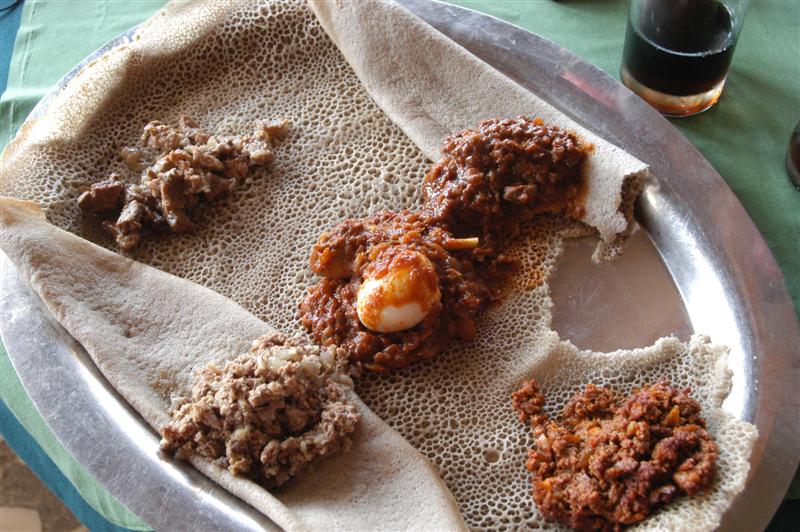 h other, communicated with some gestures, and sat together while we waited for our bus. One of the children, a little boy who couldn't have been more than two, was the life of the party. He was wearing a little blue polo style shirt that just covered him as far as his bottom. When he waived his hands around his little buns stuck out the back. He was precocious and demanding. He stomped around to get everyone's attention and got laughs from the group. Kids brought over some small branches to fan the flies away but this little kid wanted them all. I couldn't understand Amharic but I am sure he was saying "Mine! Mine!" just like every other two year old in the world. The flies were pretty insane. All we could do was just to try and not think about them. They bothered the kids more than the adults. At one point the elderly lady tried to shoe the kids away with gestures that looked like she was trying to get them to take the flies with them. An odd looking man kept coming by and staring at us but the other people made gestures like "don't worry about him", indicating that he wasn't all quite there. It was a small moment, sitting on this bench with these women and children, but it went far in making up for all of the hassles of our day. It was okay for us to just "be" with them. For the first time we were just people sitting with other people, not tourists with Ethiopians. h other, communicated with some gestures, and sat together while we waited for our bus. One of the children, a little boy who couldn't have been more than two, was the life of the party. He was wearing a little blue polo style shirt that just covered him as far as his bottom. When he waived his hands around his little buns stuck out the back. He was precocious and demanding. He stomped around to get everyone's attention and got laughs from the group. Kids brought over some small branches to fan the flies away but this little kid wanted them all. I couldn't understand Amharic but I am sure he was saying "Mine! Mine!" just like every other two year old in the world. The flies were pretty insane. All we could do was just to try and not think about them. They bothered the kids more than the adults. At one point the elderly lady tried to shoe the kids away with gestures that looked like she was trying to get them to take the flies with them. An odd looking man kept coming by and staring at us but the other people made gestures like "don't worry about him", indicating that he wasn't all quite there. It was a small moment, sitting on this bench with these women and children, but it went far in making up for all of the hassles of our day. It was okay for us to just "be" with them. For the first time we were just people sitting with other people, not tourists with Ethiopians.
Finally the bus drove into town and we had to rush off and grab our seat. We waived good-bye and went running. One little boy went with us to make sure we got on okay. When the bus stopped to let off passengers we jumped on and got a seat. By the time it reached the pick up point at the end of town it was getting full. Many young guys were trying to "hold" seats for other people but they were being batted away by the bus staff. We saw the German guy get on board but he was sitting far from us. The little boy that had walked with us stood outside the bus waiving. A couple of the older touts were trying to get our attention through the boy. He pointed to them but I could see out of the corner of my eye that they were just being nasty so I made an ugly face and shook my head. He laughed. The bus started off and as we headed out of town we waived at the women and children sitting at that little kiosk. They saw us and waived back.
We arrived back in town early enough to make arrangements for a boat to take us on a monastery tour the following day. We arranged the boat through the Marine Authority, writ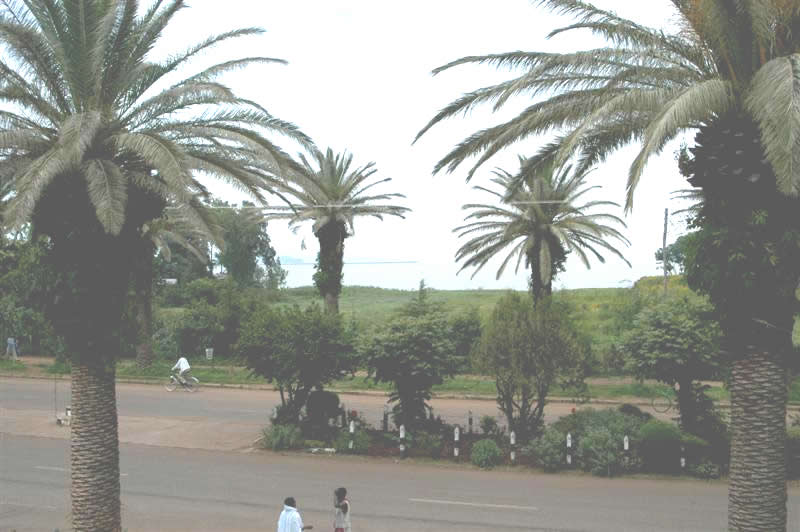 ing out a little list of the monasteries we wanted to visit and how much the boat would cost. From there we walked over to the Dib Anbessa Hotel. We weren't very happy with the Papyrus and just wanted to check out another hotel but ended up having dinner there. They had a really nice restaurant and delicious food. I had the Ethiopian fasting plate which was filling and tasty. Rob had the meat version. The view from the restaurant was nice as well, looking out over the lake. The hotel was across the street from the lake shore but nothing stood between it and the lake and the stretch of road in front of the hotel was lined with palm trees. Finally I began to understand how Bahar Dar could be considered one of Ethiopia's most attractive town. Not all of it was attractive but it had some attractive parts. We sat downstairs in the cozy bar for a while and had coffees while we watched their cable TV. The bar was well worn with dark wooden walls and cushioned booths. ing out a little list of the monasteries we wanted to visit and how much the boat would cost. From there we walked over to the Dib Anbessa Hotel. We weren't very happy with the Papyrus and just wanted to check out another hotel but ended up having dinner there. They had a really nice restaurant and delicious food. I had the Ethiopian fasting plate which was filling and tasty. Rob had the meat version. The view from the restaurant was nice as well, looking out over the lake. The hotel was across the street from the lake shore but nothing stood between it and the lake and the stretch of road in front of the hotel was lined with palm trees. Finally I began to understand how Bahar Dar could be considered one of Ethiopia's most attractive town. Not all of it was attractive but it had some attractive parts. We sat downstairs in the cozy bar for a while and had coffees while we watched their cable TV. The bar was well worn with dark wooden walls and cushioned booths. |
ADDIS ABABA
Oct 26
Oct 27
Oct 28-29
BAHAR DAR
Sept 30
Oct 1
Oct 2
Oct 2-3
GONDER
Oct 4
LALIBELA Oct 5
Oct 6
AKSUM
Oct 7
Oct 8
Oct 9
ADDIS ABABA
Oct 10-14
|

